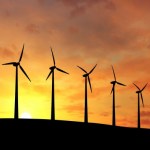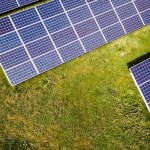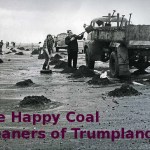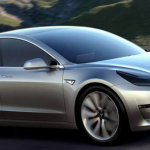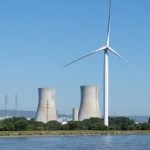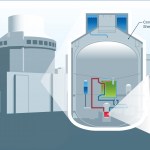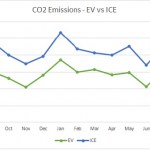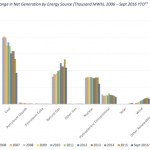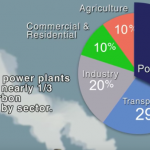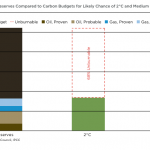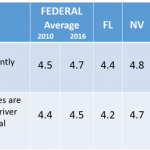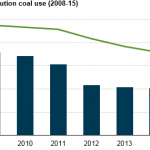energy
Sorry for the inconvenience, this post has been moved HERE.
True that. In the US, energy policy and regulation happens much more at the state level than the federal level, and our federal government went belly up last January anyway. Some states will not lead, they will go backwards, but others will lead, and show the way.
So, here I want to highlight this new item in Scientific American by Rebecca Otto.
States Can Lead the Way on Climate Change
The Trump administration's threats to abandon Obama's Clean Power Plan and exit the Paris accords don't necessarily mean all is lost
The word “corporation” does not appear in our Constitution or Bill of…
I'll just put this item from UCS here for your interest:
FOR IMMEDIATE RELEASE
Study Finds Top Fossil Fuel Producers’ Emissions Responsible for as Much as Half of Global Surface Temperature Increase, Roughly 30 Percent of Global Sea Level Rise
Findings Provide New Data to Hold Companies Responsible for Climate Change
WASHINGTON (September 7, 2017)—A first-of-its-kind study published today in the scientific journal Climatic Change links global climate changes to the product-related emissions of specific fossil fuel producers, including ExxonMobil and Chevron. Focusing on the largest gas, oil…
It suddenly became apparent, just a couple of days ago when President Trump was ranting and raving at a political rally, that the man does not know what clean coal is.
This is a concern because his entire energy policy stems from the assumption that we can mine lots of coal in West Virginia and use that for energy, that this is OK because it will be clean coal.
The term clean coal has been used in three ways, but really, is correctly used in only one way (number 2 of the three below), and when used that way, it is still bogus.
1) The term clean coal, or phrases very close to it, have been…
The Tesla Model 3 will have a 215 mile range. Zero to sixty in 6 seconds, in case you ever have to do that. Seats five adults. Five star safety rating. Uses supercharging (so, if supercharged, charges in something like the time it takes to fill up a gas car IF you also use the bathroom, pick up a candy bar, there's a few people in line ...).
It cost the same as a lot of cars a lot of people buy: $35,000.
It is 100% electric.
You can't have one yet, but if you really one one and work on it you might be able to get one by the end of the year. The first ones out will be distributed to their…
Two items I know you'll want to check out.
The ‘intellectual’ debate Rick Perry says he wants is already over
Last week, Energy Secretary Rick Perry told CNBC he considers his skepticism towards climate data to be a sign of a “wise, intellectually engaged person.” Yesterday, at a press briefing at the White House – it’s apparently supposed to be “Energy Week” – Perry used similar phrasing, calling for “an intellectual conversation” on global warming.
Four myths journalists should watch out for during Trump’s “Energy Week”
The White House has declared this to be "Energy Week" and is pushing…
There is no free lunch, but you can watch a normally unfree documentary for free on the usual streaming networks for a little while.
Click here to get to the NGS site
From Hollywood Reporter:
Michael Bloomberg, founder of Bloomberg Philanthropies, says, “Coal affects our lives and planet in important ways, but people often take positions on it without seeing the full picture. So this week, National Geographic is making From the Ashes available for free on a number of platforms. We encourage family and friends to watch the film and join the CrowdRise campaign to support organizations that are…
The Republican line is this: Bring back coal, shut down development, subsidies, any encouragement at all, for solar and wind energy.
There is absolutely no logic to this policy, but it is in fact the policy. The reason for it is generally thought to be that the big rich corporations and individuals that control coal and petroleum resources, and that are fully engaged in delivery of those energy sources (and other materials, such as plastic bags made of petroleum) pay off the politicians to support their businesses. And that is true, they do this. But that does not explain why regular…
I just read an interesting piece on the widely influential VOX, by David Roberts, called “A beginner’s guide to the debate over 100% renewable energy.” It is worth a read, but I have some problems with it, and felt compelled to rant. No offense intended to David Roberts, but I run into certain malconstructed arguments so often that I feel compelled to promote a more careful thinking out of them, or at least, how they are presented. Roberts' argument is not malconstructed, but the assumptions leading up to his key points include falsehoods.
I’m not going to explicitly disagree with the…
It is hard to get very far into a discussion of non-fossil fuel energy, and the energy transition, without someone coming along and yammering about nuclear energy.
Now, don't get me wrong. I'm all for inexpensive and safe nuclear power and for building nuclear power plants that promise to eat up all the waste, do not create any more waste, are totally safe, are affordable, are efficient, don't require the equivalent of slave labor to mine the uranium, and are cost effective. Bring it on!
But the nuclear industry is generally troubled by the fact that this list of promises is not possible…
Sometimes, when I look at the things the Republicans and their leader, Donald Trump, are doing, I think of that poignant line in so many actual and fictional moments: "You have killed me."
Someone says that because the killing is done, but they are not yet dead. The knife is driven deep, the car is heading for the cliff, the contract killer is closing in. Then the person dies, but not before they get to say, "You killed me."
Today, I look at Donald Trump, the Koch Brothers, Rex Tillerson, the petroleum industry, the Heartland institute. They didn't kill me, but they have killed my daughter,…
If most of the electricity used to charge your electric car is made by burning coal, is it still worth it, in terms of CO2 release, to buy an electric car?
Yes. And you will also save money on fuel.
Don't believe me? Want me to show you? What, are you from Missouri or something? Fine. I'll show you.
A few years ago, when there were no affordable electric cars that were real cars, we decided to look into buying the next best thing, a hybrid. We wanted to get the Toyota Prius because it looked like a good car, had long proven technology, and all the people we knew who had one were happy…
The solar energy field now produces the larest share of jobs in US Power generation. There are 374,000 jobs i Solar right now, compared to fewer than 190,00 in coal, gas, and oil.
This corresponds to shifts in the amount of electricity produced by these various sources, as indicated in the Department of Energy graph shown above.
The biggest states for this job growth are California followed distantly by Massachusetts, Nevada, New York, New Jersey, Texas, Arizona, Florida, and North Carolina.
Given current trends inside the beltway, I expect the Department of Energy to make this report…
National academies of sciences from around the world have published formal statements and declarations acknowledging the state of climate science, the fact that climate is changing, the compelling evidence that humans are responsible, and the need to debate and implement strategies to reduce emissions of greenhouse gases. Not a single national science academy disputes or denies the scientific consensus around human-caused climate change. A few examples of joint academy statements since 2000 on climate are listed here. Many national academies have, in addition, published their own reports and…
The US is already behind in its agreed to commitment to clean power
A study just out in Nature climate Change suggests that the US is already behind in its commitments to reduce the use of fossil fuel as an energy source, and the concomitant release of climate-warming greenhouse gasses into the atmosphere.
The paper, by Jeffery Greenblatt and Max Wei, says:
Current intended nationally determined contributions (INDCs)are insufficient to meet the Paris Agreement goal of limiting temperature change to between 1.5 and 2.0◦C above pre-industrial levels, so the effectiveness of existing INDCs will…
The American Geophysical Union just lost whatever remaining credibility it had as a scientific society earlier today when it announced no change in policy regarding taking money from ExxonMobil.
We talked about this before, here.
Margaret Leinen, the AGU president, issued a communication today that says this:
Last week the AGU Board of Directors discussed the organization’s April decision to continue engagement with ExxonMobil after receiving additional information from several sources. The Board maintained its original decision after another careful and systematic review of hundreds of pages…
Obviously, we need to stop the human enhanced extra greenhouse effect. There are a number of ways to approach this. Let me say right away that taking CO2, the main greenhouse gas of concern long term, out of the atmosphere is NOT one of the ways. Here's why: It takes energy to put Carbon into solid or liquid form. You get energy back when you move the Carbon into a gas form (as CO2). That is something of an oversimplification but long term, large scale, it is correct. Since, for the most part, the greenhouse effect is caused by the the generation of energy for use, which causes the movement…
By important, I mean people who have their hands on the levers of power, more or less, in areas that affect energy policy.
I don't really care if Uncle Bob doesn't accept climate change. Uncle Bob votes for right wing yahoos anyway, that wasn't going to change. Why should it matter what Uncle Bob thinks?
Unless Uncle Bob is a top policy actor involve din climate and energy issues at the federal level or in Florida, Nevada, North Carolina, or Ohio. Right?
The Climate Constituencies Project looked at these folks (Uncle Bob's colleagues as described) to see where they stand on climate change…
A lot of higher education institutions are old, and back in the day, things were different. Not only were most schools simultaneously on top of and on the bottom of great snow covered hills, but they were often surrounded by nearly medieval settlement, or at least, pre-industrial ones, that lacked things like central heat, electricity, and so on, even after these things became common and normal.
I remember the legacy of this reality at my Alma Mater, a small university in Cambridge, Mass. Most of the campus had its own heating system, which was built at a time when centrally distributed…
Dr. Jodi Sherman wants to expand the medical profession’s understanding of patient safety far beyond the exam room and hospital bed. For Sherman, the oft-heard medical mantra of “first do no harm” should also push the health care system to do more to reduce its harmful air emissions and their impact on people’s health.
“Traditionally, our duty has been to the patient in front of us,” Sherman told me. “But we have a duty to protect society as well.”
Sherman, an assistant professor of anesthesiology at Yale School of Medicine, recently co-authored a new study on harmful air pollutants coming…
